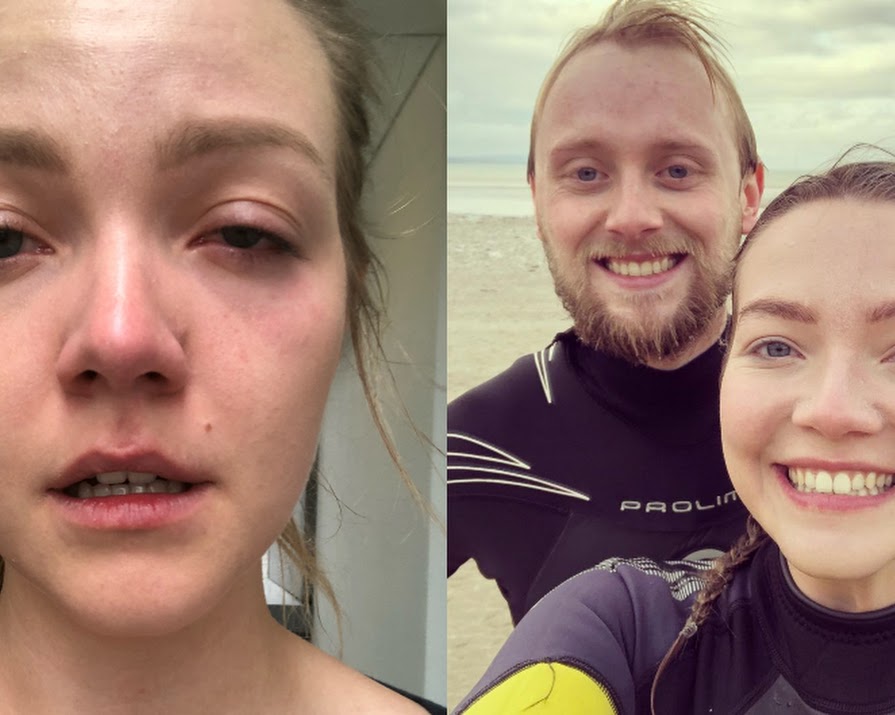Sea-swimming has helped to reduce my debilitating chronic migraine
By Grace McGettigan
12th Jul 2021
12th Jul 2021
Beth Francis on Chronic Migraine via @VitaminSeaFilm on Instagram
Beth Francis used to suffer 28 migraine days a month, but after taking up sea swimming, that number has reduced to 10
“A big chunk of my vision is gone. Blurred out.
“I feel really weak, dizzy and not with it at all.
“It hurts so much. It hurts in my teeth. It feels like my jaw is getting smaller… and this is just the start.”
This is the life of Beth Francis, a young woman who’s been suffering from migraines since the age of nine. She is 17 minutes into another migraine, and experience tells her it will last anything from five hours to three days.
In a documentary called 100 Days of Vitamin Sea, Beth documents her experience with the chronic illness. With the help of her partner, Andrew Clarke, the severity of her migraines is captured on camera.
What’s more, they document the only thing that helps her with the pain: swimming in the bitterly cold water of the Irish Sea.

What is migraine?
Migraine is a debilitating neurological disorder that’s often brushed off as ‘just a headache’ – but this couldn’t be further from the truth.
Many people don’t realise how severe the symptoms of migraine can be (or how long the symptoms can persist). A lot of people will feel nauseous and vomit, while one in five will experience aura; dark spots, flashing lights and zigzag patterns. Some lose their vision completely and others lose their speech.
“It feels as though your head is going to split open; that you’re going to die.”
Debbie Hutchinson, communications and information officer at the Migraine Association of Ireland says, “There are even forms of migraine where people can lose consciousness. Many of our members have gone to A&E with suspected stroke because they have slurred speech, numbness and drooping on one side of their face.”
Speaking in the documentary, during a worsening migraine, Beth says, “It feels as though your head is going to split open; that you’re going to die”.
It’s classified by the World Health Organisation as a disability.

Beth’s experience
Before filming the documentary, and before taking up sea swimming, Beth would have an average of 28 migraine days per month. It came as no surprise when her doctor gave her the diagnosis of ‘chronic migraine’.
Since taking up sea swimming off the coast of Anglesea, she is down to approximately 10 migraine days per month.
While she had tried five different medications, as well as nerve blocks and Botox treatments, Beth says getting into the cold water for a swim (even if just for two minutes) gives her the most relief.
It’s important to note this isn’t a cure for migraine, and Beth doesn’t claim it to be. “It’s not about making it go away,” she says. “It’s about making it easier to live with”.
For example, during one of her migraines, Beth said, “I had to drag myself to the beach. One foot in front of the other, and try my damned hardest.
“When I left the house, I was a solid seven-out-of-10 on the pain scale. Now I’m at two or three. It’s empowering,” she says while paddling through the waves, “it’s incredible”.

‘100 Days of Vitamin Sea’
After seeing the benefits of sea swimming on her chronic condition; Beth, with the help of her loyal partner Andrew, decided to take on a challenge.
Together, they would document their swims over 100 days; including both the good moments and the bad. Their documentary, 100 Days of Vitamin Sea, shows Beth when she’s feeling good, splashing about in the water; as well as when she’s in the midst of a migraine attack at home.
“I wanted to die a few minutes ago. Now I can breathe.”
Andrew’s commitment to Beth is awe-inspiring. One day, when the pain was too severe to even consider going down to the beach, he ran her an icy, cold bath. It was gut-wrenching to watch Beth clamber into the tub; her eyes and jaw clenched from the pain in her skull. Her cries, deafening.
Yet, after a few minutes, she managed to say feebly, “The pain has gone from a nine to a four. I wanted to die a few minutes ago. Now I can breathe.”
Speaking about Beth, and about what she has to go through, Andrew said, “Migraines f*cking suck. They’re a stressful, pi**y thing. But I’m an eternal optimist and I have to believe we can do something. It’s tough,” he says, “but bring it on”.

How does it work?
As a result of Beth’s positive experience with sea swimming, Professor Mike Tipton at the University of Portsmouth is investigating the scientific reason as to why it’s working.
He and his team are experimenting with focus groups to determine why exactly sea swimming helps migraine sufferers so much; whether it could be the cold temperature, the water itself, the swimming, or a variety of these things, if not more.
Professor Tipton also noted the importance of the ‘vagus nerve’; and how stimulation of this nerve may play a role in the reduction of migraine symptoms. He added that the ‘cold receptors’ in the face and body might slow down migraine symptoms too.
While the study is still ongoing, Beth has shared her personal explanation of how sea swimming helps. Speaking from the beach during the documentary, she says, “I’ve come down for the morphine-like analgesic of cold water. It feels so good. Like heaven.
“The pain-relieving effect of cold water shock – it’s like morphine,” she adds. “It isn’t a miracle cure, but it feels so good for me; like bliss.”

Blue Gym
What’s more, the 100 Days of Vitamin Sea documentary touches on the concept of ‘Blue Gym’.
The concept, which was developed in 2009 by Professor Depledge and Dr Bird at the European Centre for Environment and Health, says regular contact with natural environments (such as the sea) provides three major health benefits.
These include reduced stress, increased physical activity and the development of stronger communities. Not only that, but the researchers also found that people who live within 1 km of the coast have much better self-reported health than those who live further inland.
For more information, call the migraine helpline on 1850-200-378, visit migraine.ie, or vitaminseafilm.com.























